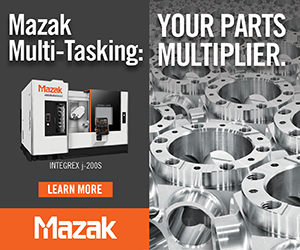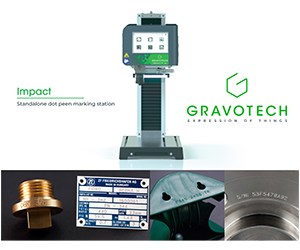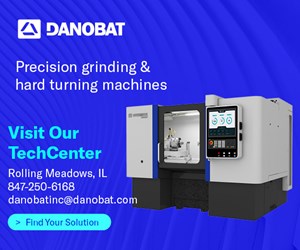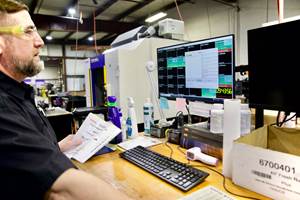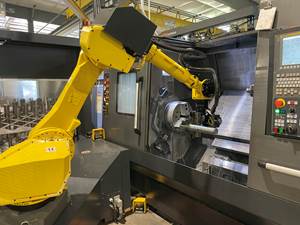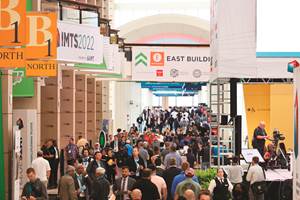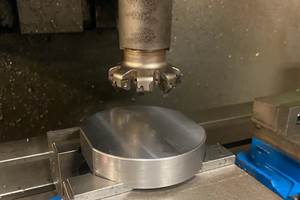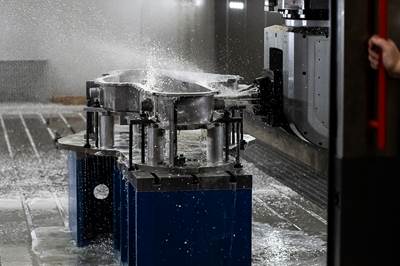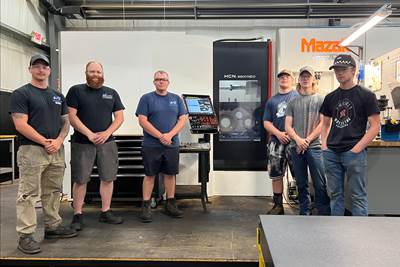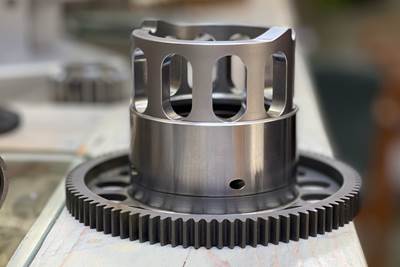What kind of machine makes a licorice stick? The level of specialization required for this machine means it could never be produced in high enough quantities to warrant a spot in a regular catalog, or as part of an OEM’s traditional offerings. Instead, customers must reach out to custom machine builders, such as Astro Machine Works.
Astro Machine Works was founded in 1984 by four friends who wanted to build custom machines. Over the course of almost four decades, the Ephrata, Pennsylvania-based company has expanded its range of markets based on capabilities it developed as a result of its initial focus on custom machines — an expansion that has also greatly benefited from passing the shop into its employees’ hands.
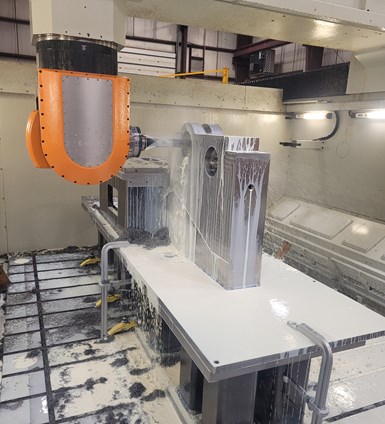
Astro’s 10-foot by 20-foot by 5-foot APEC G3060 gantry mill not only produces the long frames some of the company’s custom machines require, the mill can also machine multiple sides of five-axis parts. This versatility has led Astro’s customers to book jobs requiring the gantry mill half a year in advance. Photos courtesy of Astro Machine Works.
Building a Custom Machine Company
Building a custom machine from scratch requires a wide array of capabilities: milling and turning, certainly, but also welding, assembly, painting, electrical, hydraulic, quality, and more. Organizing these operations requires dedicated back-of-house departments and benefits from in-house HR and IT teams. Leaders from each team report to an overall operations manager, whose work is slightly eased by assigning sales and project managers to either commercial work or government work. The company tries to balance its work between these two markets 50/50.
This comprehensive range of capabilities requires Astro’s employees to undergo equally comprehensive training. This emphasis on training manifests both in robust internship and apprenticeship programs as well as a culture of continuous improvement. The internship program draws students from local high schools and technical schools, simultaneously bolstering their skill sets and furthering their education, while its state-certified apprenticeship program is a fully on-the-job, in-house training program. Apprenticeships exist for both the machining and tool-and-die departments — apprentices train on machines across their departments while also receiving instruction through ToolingU, a learning management platform developed by the Society of Manufacturing Engineers. Although many apprentices have already attended technical schools, Astro president Eric Blow says this hybrid approach is especially useful for teaching those students with no previous formal machining education, but who are good culture fits and show interest and aptitude in manufacturing.
Both inside the apprenticeship program and out, shop floor employees at Astro train on progressively more difficult machines — first on manual Bridgeport-style machines, then on three-axis machines, then on four-axis machines and those with rotary chucks, progressing to five-axis machines, and finally learning to use the shop’s multitasking Mazak Integrexes. Ideally, the company’s machinists should be able to machine anything from small parts to those requiring Astro’s five-axis gantry mill with a 10-foot by 20-foot machining area. Outside of the apprenticeship program — and outside of initial training sessions when new equipment hits the shop floor — there is no formal process for this training, with Blow describing it as simply “a matter of stepping up to a more complex unit and just putting in the time to master that new piece of equipment.”
As for how to motivate employees to push themselves, learn these new skills and act as mentors for interns and apprentices, Blow says it hasn’t been a challenge. The cooperative culture at Astro makes continuous education a regular part of the workday for most employees — and the company’s open-book management and ESOP have been heavy lifters, besides.
Management Is an Open Book
Astro has long given its employees as full a picture as possible: In late 2007, it moved to what Blow calls “open book management.” Anyone in the company could see its finances, from lines of credit to more production-focused metrics such as quoting targets and backlogs. In addition to the morale benefits of trusting employees with financial data, Astro also began a twice-yearly bonus program based on free cash flow after expenses. Employees can see how their work affects the accumulating bonus pool from month to month, encouraging them to be knowledgeable about the company and giving them more of a stake in day-to-day operations. Blow credits this shift in management style for growing the company through the 2008 recession into the early 2010s.
An additional shot in the arm came in the form of an employee stock ownership program (ESOP). Three of Astro’s founders have already retired, with only Blow remaining. While an initial deal with a local, hands-off private equity firm in 2006 during the first founder’s exit went very well for Astro, by 2016, the ownership of that firm was also looking to retire. While Blow and the owners of the private equity firm initially searched for another buyer, they ultimately determined that rolling the dice with another private equity firm would put Astro’s successful culture and operation at risk.
Employees know that expanding their own knowledge of machining techniques and teaching their coworkers will increase productivity — and, therefore, the value of everyone’s shares in the ESOP.
An ESOP “gave us the most potential to maintain our employee base, our culture, our identity,” Blow says, and in 2018, Astro began its ESOP program. While Blow is still the CEO pending his eventual retirement, the company has also created a five-person senior leadership team that works alongside him. The idea is that this team will be able to consult with and advise a future CEO, ensuring that Astro’s successful strategies continue long into the future. Astro has also safeguarded its future by developing a board of directors, which Blow is slated to join after his retirement.
What does this leadership restructuring mean for the people on the shop floor? Not too much of a change (just as planned), but the ESOP acts as a secondary retirement fund for all employees, one that grows in value when the shop performs well. As a leveraged ESOP program, share values started at $1.12, but have risen over the course of four years to a value of $114.50 per share. This rapid increase in value has made an impression on employees, who know that expanding their own knowledge of machining techniques and teaching their coworkers will increase productivity and, therefore, the value of everyone’s shares.
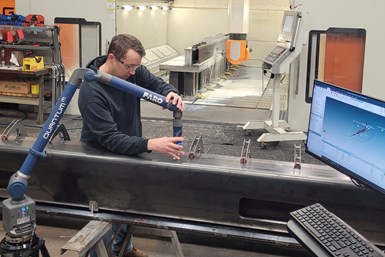
With large parts comes the need to provide quality assurance over a large area. Astro’s FaroArm portable CMM can “leapfrog” from section to section of a large part by using data points as references, according to Eric Blow.
Large Parts Are a Big Deal
This determination to expand on skills grows more important by the day as Astro invests in more complicated machines. In addition to the Mazak Integrexes, Astro uses seven five-axis machines for part production — one of which is a gantry mill designed to machine large parts.
The APEC G3060 from the Asia Pacific Elite Corporation has been producing parts 10 feet by 20 feet by 5 feet since 2016. Originally, the machine was meant to produce the 15- or 20-foot frames some custom machines required, a task Astro farmed out to other partners for many years. While the APEC gantry mill still sees much use for finish machining of large machine frames and bases, it has also proved useful for machining multiple sides of large five-axis parts, a capability that Astro’s clients quickly noticed. Orders suited to the machine arrived in such high quantities that the machine can be fully booked six to eight months in advance.
This overbooking has led Astro to order an additional gantry mill, this one a Parpas machine with a 10-foot by 10-foot workspace. This not only saves floor space (even with a grand total of 72,000 square feet of floor space, there are limits), but Blow says 80% of jobs for the APEC mill could fit onto a machine of this size. Thus, the new machine will double up on capacity for most jobs and enable the APEC machine to better focus on jobs that make use of its full range.
Multipurpose Value-Adds
This strategy of acquiring capabilities to bring more aspects of custom machine manufacturing in-house, then expanding on these capabilities as they bring in additional business, expands beyond large-part machining.
Astro purchased a fabrication shop in March 2021 — not because it lacked fabrication capabilities, but because the acquired shop had long-established relationships with the energy distribution market, which Astro hoped to enter. It also filled a fabrication niche Astro’s existing department was too busy to handle. The nine full-time welders already with Astro focused on complicated, highly technical work, leaving them with little time to complete more traditional tasks like framework for machine bases or conveyors. While the acquired fabrication shop has largely continued to focus on its existing customer base, expansion plans for the shop involve both increasing business with current customers and looping in the shop to assist with Astro’s fabrication backlog.
This expansion of capabilities also applies to the company’s certifications. While the company is already ISO 9001- and AS9100-certified, management decided to go a step further and seek NQA-1 qualification for further work in the nuclear industry. This is not a formal accreditation, but a standard companies will insist upon before scheduling work. Astro rewrote its quality management manual to fit these standards (encompassing ISO and AS quality standards), and its quality manager’s role expanded to become what Brian Hess, commercial sales manager at Astro Machine Works, describes as a “safety-related auditor.” Once a nuclear customer audits Astro, a successful result will mean Astro enters a database of shops qualified for nuclear work. While qualifying for this database will not make much of a difference for most of the shop’s clients, it adds enough to deepen their relationship with a key handful of customers.
What comes next? Astro already maintains three production buildings, but plans are in motion to construct another building with a ceiling 40-50 feet high for even larger custom machines — and whatever new capabilities Astro adds next.
Related Content
A Career at the Top Helps Rebuild a Job Shop
A new approach to management propels expansion into Swiss-type and multitasking machining work.
Read MoreSame Headcount, Double the Sales: Successful Job Shop Automation
Doubling sales requires more than just robots. Pro Products’ staff works in tandem with robots, performing inspection and other value-added activities.
Read MoreIMTS Takeaways From the Modern Machine Shop Editorial Team
The first in-person IMTS in four years left the MMS editorial staff with a lot to digest. Here are a few of our takeaways from the show floor.
Read MoreAll-Around Mill Improves Productivity and Cost for Valve Job
Adopting a mill with a double-negative rake and pockets compatible with multiple insert geometries enabled Progressive Metal Service to increase feed and lower scrap rates for a valve.
Read MoreRead Next
The Strategic Value of Machine Tool Flexibility
This aerospace and defense supplier has a strategy to take advantage of the flexibility in its newest and largest five-axis gantry-type machining center.
Read MoreTop Shop Builds Upon Employee Ownership for Future Success
In its quest to become the Fox Valley’s best-in-class employer, A to Z Machine has adopted an ESOP, expanded benefits and invested in apprenticeships.
Read MoreThe Art of Maintaining Continuous Improvement
Production efficiencies, setup efficiencies, plant utilization record, safety records, on-time delivery performance — all of these metrics and more place Forest City Gear among the elite when it comes the use of ongoing improvement methodologies.
Read More


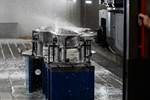
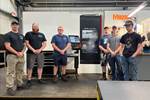
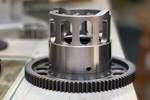

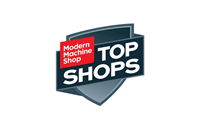
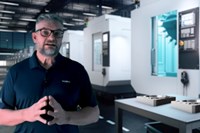






.png;maxWidth=300;quality=90)

.png;maxWidth=300;quality=90)
